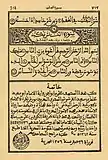Warsh recitation
The Warsh recitation or riwāyat Warsh ʿan Nāfiʿ' (Arabic: رواية ورش عن نافع) is a qiraʿah of the Quran in Islam.[1]
| Part of a series on |
| Islam |
|---|
 |
Presentation
This qirāʾah or recitation of the Quran (literally "reading") is conducted according to the rules of tajwid,[2] in accordance with the ahruf.[3]
This method is attributed to Warsh, who himself obtained it from his teacher Nafiʽ al-Madani, who was one of the seven readers who transmitted the Ten Readings.[4]
The recitation of Warsh is one of the two major traditions of qirāʾāt.[5]
History
This recitation relates to Imam Warsh (716-813 CE), whose real name is Uthman Ibn Sa‘id al-Qutbi and was born in Egypt.[6]
His nickname Warsh (Arabic: وَرْش), a milk substance, came from his teacher Nafiʽ al-Madani due to his fair complexion.[7]
He studied his recitation according to Naafiʽ in Medina.[8]
After completing his studies, he returned to Egypt where he became the senior Qāriʾ of the Quran.[9]
In the tenth century, the Muslim scholar Abu Bakr Ibn Mujāhid canonized the seven readings of the Quran, including Warsh ʽan Naafiʽ.[10]
Although having emerged in Egypt, the recitation of Warsh ʽan Naafiʽ has become widespread in North Africa.[11]
In medieval times, it was the main Quranic recitation in Al-Andalus.[12]
The transmission of Warsh ʽan Naafiʽ represents the reciting tradition of Medina.[13]
It is, alongside the Hafs recitation tradition which represents the recitation tradition of Kufa, one of the two main oral transmissions of the Quran in the Muslim world.[14]
Gallery
Warsh recitation with Maghrebi script
 End of the Thaalibia Quran.
End of the Thaalibia Quran.
See also
References
- السمنودي, أبي عبد الله محمد بن حسن/المنير (January 1, 2011). إتحاف حملة القرآن برواية سيدي ورش عن الإمام نافع من طريق الشاطبية. Dar Al Kotob Al Ilmiyah دار الكتب العلمية. ISBN 9782745169389 – via Google Books.
- Hassan, Osama (18 December 2014). العلوم التجويدية في شرح المقدمة الجزرية soft cover. ISBN 9781312650459 – via books.google.dz.
- "الزيادة والإحسان في علوم القرآن 1-3 ج2". January 2009 – via books.google.dz.
- علي, ابن سوار البغدادي/أبو طاهر أحمد بن (January 1, 2010). المستنير في القراءات العشر. Dar Al Kotob Al Ilmiyah دار الكتب العلمية. ISBN 9782745152985 – via Google Books.
- الجزري, شمس الدين أبي الخير محمد بن محمد/ابن (January 1, 2016). النشر في القراءات العشر. Dar Al Kotob Al Ilmiyah دار الكتب العلمية. ISBN 9782745136954 – via Google Books.
- القلانسي, أبي العز محمد بن بندار/الواسطي (January 1, 2007). الكفاية الكبرى في القراءات العشر. Dar Al Kotob Al Ilmiyah دار الكتب العلمية. ISBN 9782745154095 – via Google Books.
- النويري, محمد بن محمد بن محمد بن علي. "شرح طيبة النشر في القراءات العشر - الجزء الأول". ktab INC. – via Google Books.
- الحسن, أبو الكرم الشهرزوري/المبارك بن (January 1, 2008). المصباح الزاهر في القراءات العشر البواهر 1-2 ج1. Dar Al Kotob Al Ilmiyah دار الكتب العلمية. ISBN 9782745156877 – via Google Books.
- "طيبة النشر في القراءات العشر". IslamKotob – via Google Books.
- "شرح طيبة النشر في القراءات العشر". IslamKotob – via Google Books.
- الواسطي, عبد الله بن عبد المؤمن/ابن الوجيه (January 1, 1998). الكنز في القراءات العشر. Dar Al Kotob Al Ilmiyah دار الكتب العلمية. ISBN 9782745122971 – via Google Books.
- الاختلاف الصرفي في القراءات العشر وأثره في اتساع المعاني. January 2019. ISBN 9782745193087 – via books.google.dz.
- مهران, أبي بكر أحمد بن الحسين/ابن (January 1, 2018). الغاية في القراءات العشر. Dar Al Kotob Al Ilmiyah دار الكتب العلمية. ISBN 9782745152862 – via Google Books.
- "المبسوط في القراءات العشر". 1980 – via books.google.dz.